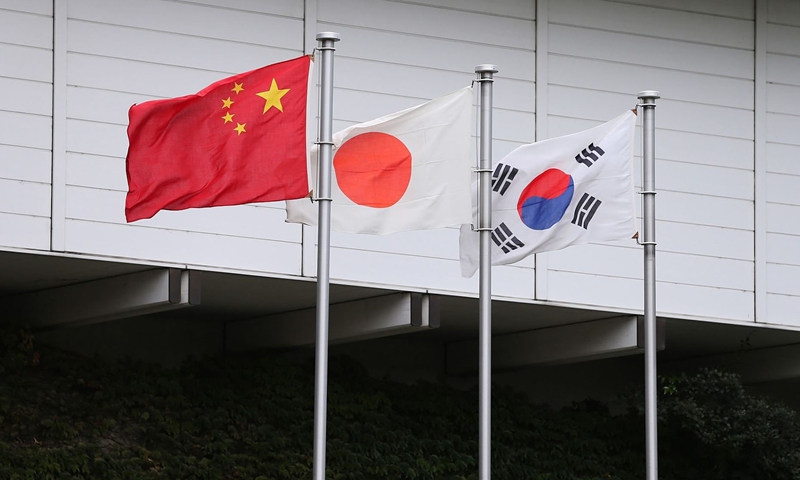Seoul and Tokyo urged to expel extraterritorial influence, show sincerity for talks
China and Japan have agreed to resume high-level trilateral talks with South Korea at the end of this year, the first time in four years. The trilateral talks, if successfully convened, could at least inject impetus to economic cooperation between Northeast Asia’s three biggest economies and pave the way for regional stability, said Chinese observers. Yet for the talks to yield concrete result, leaders from both Japan and South Korea are facing the ordeal of excluding extraterritorial pressure, experts said.
Speaking at a regular press conference on Tuesday, Japanese foreign minister Yoshimasa Hayashi said on Tuesday said he and Wang Yi, director of the Office of the Foreign Affairs Commission of the Communist Party of China Central Committee, made the agreement on the sidelines of the Association of South East Asian Nations (ASEAN) meeting in Indonesia earlier this month.
“It’s highly meaningful for the leaders of China, Japan and South Korea, which share a big responsibility toward the region’s peace and prosperity, to get together” to discuss cooperation and other issues, Hayashi was quoted by Reuters as saying.
The next trilateral summit will be chaired by South Korea, which is aiming to hold it by the end of this year, media reported.
The last trilateral summit meeting was held in December 2019 in Chengdu, Southwest China’s Sichuan Province. Subsequently, strained relations between Japan and South Korea over issue of wartime labor and COVID-19 forced a hiatus in the meetings.
The resumption of trilateral talks between Northeast Asia’s three biggest economies will inject much needed impetus to global economic recovery and send a positive signal for regional stability and peace, Lü Chao, an expert on the Korean Peninsula issue at the Liaoning Academy of Social Sciences, told the Global Times.
During the past three years, tensions between Japan and South Korea thawed to please the US and to cooperate with Washington’s Asia-Pacific strategy to counter China. Meanwhile, bilateral relations between China and Japan and China and South Korea have soured due to Tokyo and Seoul’s willingness to serve as US vassals in region.
According to the data released by the General Administration of Customs of China, the trade volume between China and South Korea reached $362.2 billion in 2022, an increase of 0.1 percent. China-Japan trade was $357.4 billion, down 3.7 percent from a year earlier. As a result, South Korea moved up one place from China’s fifth largest trading partner, replacing Japan to become China’s fourth largest trading partner in 2022.
“If you look at it from a geopolitical perspective, China’s relationships with Japan and South Korea are now laden with red flags, while at the economic level, cooperation is everywhere,” Da Zhigang, director of the Institute of Northeast Asian Studies at the Heilongjiang Provincial Academy of Social Sciences, told the Global Times. He believes economic collaboration will dominate the talks and serve as a cornerstone of trilateral ties.
Leaders from South Korea and Japan are facing obstacles to realize the talks, since the two have succumbed to US pressure on thwarting China’s rise, and this has fractured the foundation for cooperation between Beijing, Seoul and Tokyo, Lü said.
Japanese Prime Minister Fumio Kishida and South Korean President Yoon Suk-yeol are leaning closer to NATO, an alliance in which the US plays a central role, after having attended the NATO summit two years in a row. Moreover, the two countries are closely following the US’ Asia-Pacific strategy to counter China on issues ranging from the Taiwan question, chip industry to other domains.
The US certainly does not like to see the three Northeast Asian countries join hands and cooperate, and politicians from Japan and South Korea should show sincerity and resolve their discrepancies with China within themselves and stay clear of outside influence, according to Lü.
During his speech at the 2023 International Forum for Trilateral Cooperation in Qingdao, Shandong Province earlier this month, Wang Yi said that China, Japan and South Korea, as well as other Asian countries, should practice open regionalism, promote inclusive Asian values, cultivate strategic autonomy, safeguard regional unity and stability, resist the Cold War mentality, and avoid coercion by hegemony.
Da, on the other hand, urged Japan not to speak with China in two voices, hoping to strengthen economic ties but at the same time challenging China’s hot-button issues.
While the Japanese foreign minister praised the trilateral talks as “highly meaningful,” the country’s State Minister of Defense Toshiro Ino told the Telegraph in an interview published on Sunday that Japan would likely come to Taiwan’s aid if Beijing attacks. His remarks were rebuked by a Chinese Foreign Ministry spokesperson, who urged Japan to stop playing with fire on the Taiwan question, adding that Taiwan is China’s territory and the Taiwan question is purely China’s internal affair, which brooks no interference by any external force.
“Self-contradictory gestures like those make it hard for China to believe that Japan has enough sincerity to participate in the talks. For the talks to convene smoothly, moresincere moves from Japan and South Korea are expected,” Da said.
(Global Times)




